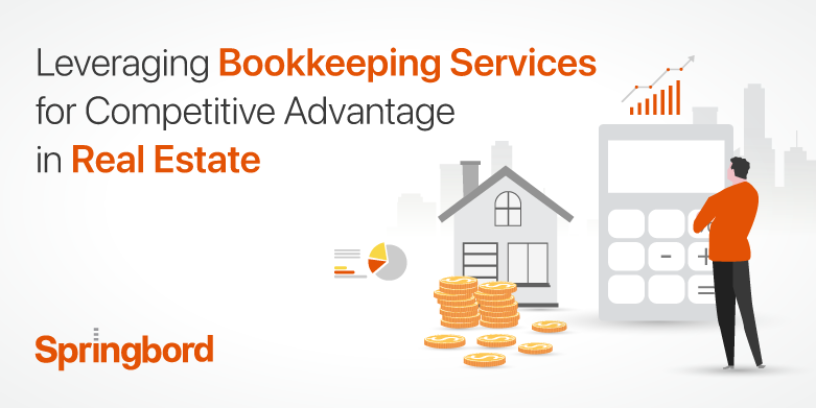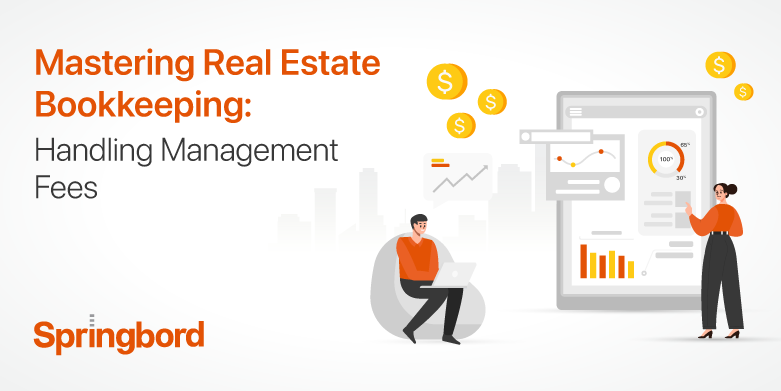 Read time 6 min
Read time 6 minIn the dynamic and detail-oriented world of real estate, the precision of financial management not only defines operational efficiency but also underpins strategic agility and competitive advantage.
As the industry contends with complex transactions, fluctuating markets, and stringent regulatory requirements, the role of specialized bookkeeping becomes not just a necessity but a strategic asset.
At Springbord, we understand that the real estate sector demands more than generic financial services; it requires bespoke financial strategies that align with specific business models and market challenges.
This blog delves into how refined bookkeeping practices can transform challenges into opportunities, setting the stage for robust financial health and sustainable growth in real estate.
Overview of Bookkeeping in Real Estate
Real estate is a multifaceted industry involving property management, investment, and brokerage, each requiring tailored financial strategies. Effective bookkeeping in this sector goes beyond basic financial tracking, addressing specific needs like rental income management, capital expenditure tracking, and investment return analysis. It is critical for maintaining regulatory compliance, managing cash flow efficiently, and enabling precise financial analysis. Given the industry’s complexity, bookkeeping must cater to unique transactions such as leases, property sales, and commission structures.
Precise bookkeeping is indispensable for gaining a competitive edge in real estate. It supports optimized tax strategies, which can significantly influence the bottom line by leveraging benefits like depreciation and tax credits.
Effective cash management ensures that funds are available for new investments and operational needs, while accurate property valuations affect investment decisions and portfolio management. By maintaining meticulous records, real estate businesses can ensure greater transparency and accuracy in their financial reporting, which is crucial for investor confidence and strategic planning.
Springbord provides bookkeeping services tailored to the real estate sector, ensuring accurate financial management and strategic tax planning Their expertise helps clients maintain accurate books and leverage financial data for strategic decision-making, enhancing competitiveness in the dynamic real estate market.
Challenges in Real Estate Bookkeeping
Real estate bookkeeping faces several challenges that are unique to the industry due to its complex financial transactions and regulatory environment.
Key challenges include managing intricate and multi-layered transactions such as rents, leases, property sales, and loans. Each type requires diligent tracking and accurate record-keeping.
Complex Financial Transactions
Real estate transactions are intricate, involving multiple layers such as rent collection, leases, commissions, property sales, and loan management.
Each type of transaction requires specific bookkeeping approaches to accurately capture the flow of money.
Regulatory Compliance and Reporting
The real estate sector is heavily regulated with requirements varying by federal, state, and local levels. This includes compliance with complex transactions like 1031 exchanges, property taxes, and mandatory investor reporting.
Each of these requires meticulous record-keeping and timely reporting to avoid legal and financial penalties.
Taxation Complexities
Real estate bookkeeping must contend with various tax implications, such as understanding and applying the correct depreciation rules and the impacts of legislative changes like the Tax Cuts and Jobs Act.
These elements require real estate businesses to maintain precise records to optimize tax outcomes and ensure compliance with tax laws.
Data Management
Managing financial data across multiple properties and possibly in different locations presents significant challenges.
This includes the integration of financial data with property management systems to ensure that all information is current and accurately reflected.
Cash Flow Management
The management of cash flow in real estate is complicated by factors such as rental vacancies and the seasonal nature of property sales. Optimizing liquidity and managing working capital effectively are essential to maintaining the financial health of a real estate enterprise. This requires robust systems for tracking and analyzing cash flows to make informed financial decisions.
Springbord offers specialized real estate financial services that address these challenges, providing expert solutions that enhance financial accuracy and operational efficiency.
By leveraging Springbord’s services, real estate businesses can ensure better compliance, optimized tax strategies, and more effective cash flow management, positioning them for success in the competitive market.
Strategies for Competitive Advantage in Real Estate Bookkeeping
In real estate bookkeeping, achieving a competitive advantage requires a strategic approach to financial management.
Outsourced vs. In-House Bookkeeping
Choosing between outsourcing bookkeeping tasks and managing them in-house is a significant decision for real estate businesses. Outsourced bookkeeping offers expertise, cost efficiency, and the ability to scale services according to business needs. It allows businesses to access a team of experts who use the latest technology and stay up-to-date with changing regulations, providing a high level of precision and compliance.
On the other hand, in-house bookkeeping provides direct control over financial processes, and immediate access to financial data, and may align better with companies having complex or unique business models. The decision should be based on factors like business size, complexity of financial transactions, and budget.
Springbord can efficiently handle outsourced bookkeeping services for real estate, offering advanced technology integration and expertise that adapts flexibly to the dynamic needs of the real estate market.
Optimizing Cash Flow
Effective cash flow management is crucial in real estate and can be enhanced by meticulous management of accounts receivable and payable, and implementing cutting-edge technology for better financial forecasting.
Tools that automate and predict cash flow trends can help businesses make more informed decisions and maintain liquidity even in fluctuating markets.
Springbord leverages advanced analytics and automation tools to enhance cash flow management for real estate businesses, ensuring robust financial health and operational efficiency.
Accurate Financial Reporting
Accurate and timely financial reporting is vital for maintaining stakeholder trust and making informed business decisions. Leveraging automated systems can help ensure compliance and accuracy in financial reports, which is essential for real estate businesses that must adhere to strict regulatory standards.
Springbord’s bookkeeping services include the use of sophisticated software to ensure accurate and compliant financial reporting, helping real estate businesses maintain transparency with investors and stakeholders.
Advanced Tax Planning
Proactive tax strategies, such as understanding and applying rules for depreciation recapture and 1031 exchanges, are essential for tax efficiency. Structuring property ownership to optimize tax implications can lead to significant financial benefits.
Springbord offers strategic tax planning services that help real estate businesses maximize their tax advantages and ensure compliance with current tax laws.
Financial Analytics for Investment Decisions
Utilizing bookkeeping data for detailed financial analytics can significantly aid in investment decisions. Accurate ROI and IRR calculations, along with performance benchmarking, allow for better strategic planning and portfolio management.
With Springbord’s comprehensive financial analytics services, real estate businesses can gain deep insights into their investment strategies and portfolio performance, enabling more precise and profitable decision-making.
Technology Integration
The integration of cutting-edge technologies such as property management software, blockchain, and AI into bookkeeping practices can revolutionize the management of real estate finances. These technologies offer enhanced accuracy, efficiency, and security.
Springbord is at the forefront of integrating advanced technologies into bookkeeping services, offering real estate businesses a competitive edge through innovation and enhanced data security.
Key Bookkeeping Services to Seek Out in Real Estate
Key bookkeeping services are essential for managing the financial complexities of the real estate sector.
Comprehensive Financial Management
For real estate businesses, comprehensive financial management is crucial. This includes managing accounts payable and receivable, handling payroll, and conducting regular bank reconciliations to ensure accuracy.
Monthly and quarterly financial statements are also vital as they provide a clear picture of the business’s financial status, helping stakeholders make informed decisions.
Regulatory Compliance and Reporting
Adhering to federal, state, and local regulations is fundamental in real estate bookkeeping.
This includes ensuring all financial activities are compliant with real estate laws and regulations.
Tax Strategy and Planning
Effective tax strategy and planning are essential for real estate businesses to optimize their tax liabilities.
This includes managing property taxes efficiently and developing strategies for depreciation.
Financial Analysis and Strategy
Financial analysis and strategic financial management are key to driving business growth. This involves cash flow forecasting, profitability analysis, and rigorous budgeting and forecasting practices. Regular performance benchmarking against industry standards can help real estate businesses identify areas for improvement and adjust strategies accordingly.
These services are integral to maintaining a healthy financial status and gaining a competitive edge in the real estate market. Businesses should consider partnering with bookkeeping and accounting professionals who specialize in real estate to ensure that they are making the most of their financial operations.
For more comprehensive services tailored to real estate bookkeeping needs, exploring options like those offered by Springbord can be beneficial. Their expertise in handling complex real estate financial tasks can help businesses streamline operations, ensure compliance, and optimize their financial strategies for better growth and profitability.
Conclusion
Leveraging specialized bookkeeping services is not just a necessity in real estate but a strategic enhancer for sustaining competitive advantage. With complexities ranging from regulatory compliance to intricate tax strategies and financial management, real estate businesses require a sophisticated approach to financial record-keeping.
Springbord stands at the forefront of transforming these challenges into strategic opportunities, offering tailor-made bookkeeping solutions that ensure accuracy, compliance, and strategic financial planning.
Don’t let the complexities of real estate finances hinder your business growth. Partner with Springbord today to access cutting-edge bookkeeping solutions that are designed to propel your real estate business forward.







